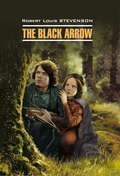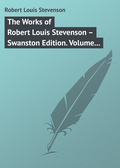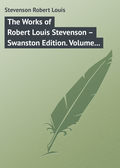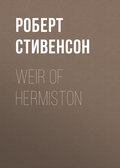
Роберт Льюис Стивенсон
Memories and Portraits
CHAPTER XIII. A PENNY PLAIN AND TWOPENCE COLOURED
These words will be familiar to all students of Skelt’s Juvenile Drama. That national monument, after having changed its name to Park’s, to Webb’s, to Redington’s, and last of all to Pollock’s, has now become, for the most part, a memory. Some of its pillars, like Stonehenge, are still afoot, the rest clean vanished. It may be the Museum numbers a full set; and Mr. Ionides perhaps, or else her gracious Majesty, may boast their great collections; but to the plain private person they are become, like Raphaels, unattainable. I have, at different times, possessed Aladdin, The Red Rover, The Blind Boy, The Old Oak Chest, The Wood Dæmon, Jack Sheppard, The Miller and his Men, Der Freischütz, The Smuggler, The Forest of Bondy, Robin Hood, The Waterman, Richard I., My Poll and my Partner Joe, The Inchcape Bell (imperfect), and Three-Fingered Jack, The Terror of Jamaica; and I have assisted others in the illumination of Maid of the Inn and The Battle of Waterloo. In this roll-call of stirring names you read the evidences of a happy childhood; and though not half of them are still to be procured of any living stationer, in the mind of their once happy owner all survive, kaleidoscopes of changing pictures, echoes of the past.
There stands, I fancy, to this day (but now how fallen!) a certain stationer’s shop at a corner of the wide thoroughfare that joins the city of my childhood with the sea. When, upon any Saturday, we made a party to behold the ships, we passed that corner; and since in those days I loved a ship as a man loves Burgundy or daybreak, this of itself had been enough to hallow it. But there was more than that. In the Leith Walk window, all the year round, there stood displayed a theatre in working order, with a “forest set,” a “combat,” and a few “robbers carousing” in the slides; and below and about, dearer tenfold to me! the plays themselves, those budgets of romance, lay tumbled one upon another. Long and often have I lingered there with empty pockets. One figure, we shall say, was visible in the first plate of characters, bearded, pistol in hand, or drawing to his ear the clothyard arrow; I would spell the name: was it Macaire, or Long Tom Coffin, or Grindoff, 2d dress? O, how I would long to see the rest! how – if the name by chance were hidden – I would wonder in what play he figured, and what immortal legend justified his attitude and strange apparel! And then to go within, to announce yourself as an intending purchaser, and, closely watched, be suffered to undo those bundles and breathlessly devour those pages of gesticulating villains, epileptic combats, bosky forests, palaces and war-ships, frowning fortresses and prison vaults – it was a giddy joy. That shop, which was dark and smelt of Bibles, was a loadstone rock for all that bore the name of boy. They could not pass it by, nor, having entered, leave it. It was a place besieged; the shopmen, like the Jews rebuilding Salem, had a double task. They kept us at the stick’s end, frowned us down, snatched each play out of our hand ere we were trusted with another, and, increditable as it may sound, used to demand of us upon our entrance, like banditti, if we came with money or with empty hand. Old Mr. Smith himself, worn out with my eternal vacillation, once swept the treasures from before me, with the cry: “I do not believe, child, that you are an intending purchaser at all!” These were the dragons of the garden; but for such joys of paradise we could have faced the Terror of Jamaica himself. Every sheet we fingered was another lightning glance into obscure, delicious story; it was like wallowing in the raw stuff of story-books. I know nothing to compare with it save now and then in dreams, when I am privileged to read in certain unwrit stories of adventure, from which I awake to find the world all vanity. The crux of Buridan’s donkey was as nothing to the uncertainty of the boy as he handled and lingered and doated on these bundles of delight; there was a physical pleasure in the sight and touch of them which he would jealously prolong; and when at length the deed was done, the play selected, and the impatient shopman had brushed the rest into the gray portfolio, and the boy was forth again, a little late for dinner, the lamps springing into light in the blue winter’s even, and The Miller, or The Rover, or some kindred drama clutched against his side – on what gay feet he ran, and how he laughed aloud in exultation! I can hear that laughter still. Out of all the years of my life, I can recall but one home-coming to compare with these, and that was on the night when I brought back with me the Arabian Entertainments in the fat, old, double-columned volume with the prints. I was just well into the story of the Hunchback, I remember, when my clergyman-grandfather (a man we counted pretty stiff) came in behind me. I grew blind with terror. But instead of ordering the book away, he said he envied me. Ah, well he might!
The purchase and the first half-hour at home, that was the summit. Thenceforth the interest declined by little and little. The fable, as set forth in the play-book, proved to be not worthy of the scenes and characters: what fable would not? Such passages as: “Scene 6. The Hermitage. Night set scene. Place back of scene 1, No. 2, at back of stage and hermitage, Fig. 2, out of set piece, R. H. in a slanting direction” – such passages, I say, though very practical, are hardly to be called good reading. Indeed, as literature, these dramas did not much appeal to me. I forget the very outline of the plots. Of The Blind Boy, beyond the fact that he was a most injured prince and once, I think, abducted, I know nothing. And The Old Oak Chest, what was it all about? that proscript (1st dress), that prodigious number of banditti, that old woman with the broom, and the magnificent kitchen in the third act (was it in the third?) – they are all fallen in a deliquium, swim faintly in my brain, and mix and vanish.
I cannot deny that joy attended the illumination; nor can I quite forget that child who, wilfully foregoing pleasure, stoops to “twopence coloured.” With crimson lake (hark to the sound of it – crimson lake! – the horns of elf-land are not richer on the ear) – with crimson lake and Prussian blue a certain purple is to be compounded which, for cloaks especially, Titian could not equal. The latter colour with gamboge, a hated name although an exquisite pigment, supplied a green of such a savoury greenness that to-day my heart regrets it. Nor can I recall without a tender weakness the very aspect of the water where I dipped my brush. Yes, there was pleasure in the painting. But when all was painted, it is needless to deny it, all was spoiled. You might, indeed, set up a scene or two to look at; but to cut the figures out was simply sacrilege; nor could any child twice court the tedium, the worry, and the long-drawn disenchantment of an actual performance. Two days after the purchase the honey had been sucked. Parents used to complain; they thought I wearied of my play. It was not so: no more than a person can be said to have wearied of his dinner when he leaves the bones and dishes; I had got the marrow of it and said grace.
Then was the time to turn to the back of the play-book and to study that enticing double file of names, where poetry, for the true child of Skelt, reigned happy and glorious like her Majesty the Queen. Much as I have travelled in these realms of gold, I have yet seen, upon that map or abstract, names of El Dorados that still haunt the ear of memory, and are still but names. The Floating Beacon– why was that denied me? or The Wreck Ashore? Sixteen-String Jack whom I did not even guess to be a highwayman, troubled me awake and haunted my slumbers; and there is one sequence of three from that enchanted calender that I still at times recall, like a loved verse of poetry: Lodoiska, Silver Palace, Echo of Westminster Bridge. Names, bare names, are surely more to children than we poor, grown-up, obliterated fools remember.
The name of Skelt itself has always seemed a part and parcel of the charm of his productions. It may be different with the rose, but the attraction of this paper drama sensibly declined when Webb had crept into the rubric: a poor cuckoo, flaunting in Skelt’s nest. And now we have reached Pollock, sounding deeper gulfs. Indeed, this name of Skelt appears so stagey and piratic, that I will adopt it boldly to design these qualities. Skeltery, then, is a quality of much art. It is even to be found, with reverence be it said, among the works of nature. The stagey is its generic name; but it is an old, insular, home-bred staginess; not French, domestically British; not of to-day, but smacking of O. Smith, Fitzball, and the great age of melodrama: a peculiar fragrance haunting it; uttering its unimportant message in a tone of voice that has the charm of fresh antiquity. I will not insist upon the art of Skelt’s purveyors. These wonderful characters that once so thrilled our soul with their bold attitude, array of deadly engines and incomparable costume, to-day look somewhat pallidly; the extreme hard favour of the heroine strikes me, I had almost said with pain; the villain’s scowl no longer thrills me like a trumpet; and the scenes themselves, those once unparalleled landscapes, seem the efforts of a prentice hand. So much of fault we find; but on the other side the impartial critic rejoices to remark the presence of a great unity of gusto; of those direct clap-trap appeals, which a man is dead and buriable when he fails to answer; of the footlight glamour, the ready-made, bare-faced, transpontine picturesque, a thing not one with cold reality, but how much dearer to the mind!
The scenery of Skeltdom – or, shall we say, the kingdom of Transpontus? – had a prevailing character. Whether it set forth Poland as in The Blind Boy, or Bohemia with The Miller and his Men, or Italy with The Old Oak Chest, still it was Transpontus. A botanist could tell it by the plants. The hollyhock was all pervasive, running wild in deserts; the dock was common, and the bending reed; and overshadowing these were poplar, palm, potato tree, and Quercus Skeltica– brave growths. The caves were all embowelled in the Surreyside formation; the soil was all betrodden by the light pump of T. P. Cooke. Skelt, to be sure, had yet another, an oriental string: he held the gorgeous east in fee; and in the new quarter of Hyères, say, in the garden of the Hotel des Iles d’Or, you may behold these blessed visions realised. But on these I will not dwell; they were an outwork; it was in the occidental scenery that Skelt was all himself. It had a strong flavour of England; it was a sort of indigestion of England and drop-scenes, and I am bound to say was charming. How the roads wander, how the castle sits upon the hill, how the sun eradiates from behind the cloud, and how the congregated clouds themselves up-roll, as stiff as bolsters! Here is the cottage interior, the usual first flat, with the cloak upon the nail, the rosaries of onions, the gun and powder-horn and corner-cupboard; here is the inn (this drama must be nautical, I foresee Captain Luff and Bold Bob Bowsprit) with the red curtain, pipes, spittoons, and eight-day clock; and there again is that impressive dungeon with the chains, which was so dull to colour. England, the hedgerow elms, the thin brick houses, windmills, glimpses of the navigable Thames – England, when at last I came to visit it, was only Skelt made evident: to cross the border was, for the Scotsman, to come home to Skelt; there was the inn-sign and there the horse-trough, all foreshadowed in the faithful Skelt. If, at the ripe age of fourteen years, I bought a certain cudgel, got a friend to load it, and thenceforward walked the tame ways of the earth my own ideal, radiating pure romance – still I was but a puppet in the hand of Skelt; the original of that regretted bludgeon, and surely the antitype of all the bludgeon kind, greatly improved from Cruikshank, had adorned the hand of Jonathan Wild, pl. i. “This is mastering me,” as Whitman cries, upon some lesser provocation. What am I? what are life, art, letters, the world, but what my Skelt has made them? He stamped himself upon my immaturity. The world was plain before I knew him, a poor penny world; but soon it was all coloured with romance. If I go to the theatre to see a good old melodrama, ’tis but Skelt a little faded. If I visit a bold scene in nature, Skelt would have been bolder; there had been certainly a castle on that mountain, and the hollow tree – that set piece – I seem to miss it in the foreground. Indeed, out of this cut-and-dry, dull, swaggering, obtrusive, and infantile art, I seem to have learned the very spirit of my life’s enjoyment; met there the shadows of the characters I was to read about and love in a late future; got the romance of Der Freischütz long ere I was to hear of Weber or the mighty Formes; acquired a gallery of scenes and characters with which, in the silent theatre of the brain, I might enact all novels and romances; and took from these rude cuts an enduring and transforming pleasure. Reader – and yourself?
A word of moral: it appears that B. Pollock, late J. Redington, No. 73 Hoxton Street, not only publishes twenty-three of these old stage favourites, but owns the necessary plates and displays a modest readiness to issue other thirty-three. If you love art, folly, or the bright eyes of children, speed to Pollock’s, or to Clarke’s of Garrick Street. In Pollock’s list of publicanda I perceive a pair of my ancient aspirations: Wreck Ashore and Sixteen-String Jack; and I cherish the belief that when these shall see once more the light of day, B. Pollock will remember this apologist. But, indeed, I have a dream at times that is not all a dream. I seem to myself to wander in a ghostly street – E. W., I think, the postal district – close below the fool’s-cap of St. Paul’s, and yet within easy hearing of the echo of the Abbey bridge. There in a dim shop, low in the roof and smelling strong of glue and footlights, I find myself in quaking treaty with great Skelt himself, the aboriginal all dusty from the tomb. I buy, with what a choking heart – I buy them all, all but the pantomimes; I pay my mental money, and go forth; and lo! the packets are dust.
CHAPTER XIV. A GOSSIP ON A NOVEL OF DUMAS’S
The books that we re-read the oftenest are not always those that we admire the most; we choose and we re-visit them for many and various reasons, as we choose and revisit human friends. One or two of Scott’s novels, Shakespeare, Molière, Montaigne, The Egoist, and the Vicomte de Bragelonne, form the inner circle of my intimates. Behind these comes a good troop of dear acquaintances; The Pilgrim’s Progress in the front rank, The Bible in Spain not far behind. There are besides a certain number that look at me with reproach as I pass them by on my shelves: books that I once thumbed and studied: houses which were once like home to me, but where I now rarely visit. I am on these sad terms (and blush to confess it) with Wordsworth, Horace, Burns and Hazlitt. Last of all, there is the class of book that has its hour of brilliancy – glows, sings, charms, and then fades again into insignificance until the fit return. Chief of those who thus smile and frown on me by turns, I must name Virgil and Herrick, who, were they but must have stood in the first company with the six names of my continual literary intimates. To these six, incongruous as they seem, I have long been faithful, and hope to be faithful to the day of death. I have never read the whole of Montaigne, but I do not like to be long without reading some of him, and my delight in what I do read never lessens. Of Shakespeare I have read all but Richard III., Henry VI., Titus Andronicus, and All’s Well that Ends Well; and these, having already made all suitable endeavour, I now know that I shall never read – to make up for which unfaithfulness I could read much of the rest for ever. Of Molière – surely the next greatest name of Christendom – I could tell a very similar story; but in a little corner of a little essay these princes are too much out of place, and I prefer to pay my fealty and pass on. How often I have read Guy Mannering, Rob Roy, or Redgauntlet, I have no means of guessing, having begun young. But it is either four or five times that I have read The Egoist, and either five or six that I have read the Vicomte de Bragelonne.
“Their sometime selves the same throughout the year,”
Some, who would accept the others, may wonder that I should have spent so much of this brief life of ours over a work so little famous as the last. And, indeed, I am surprised myself; not at my own devotion, but the coldness of the world. My acquaintance with the Vicomte began, somewhat indirectly, in the year of grace 1863, when I had the advantage of studying certain illustrated dessert plates in a hotel at Nice. The name of d’Artagnan in the legends I already saluted like an old friend, for I had met it the year before in a work of Miss Yonge’s. My first perusal was in one of those pirated editions that swarmed at that time out of Brussels, and ran to such a troop of neat and dwarfish volumes. I understood but little of the merits of the book; my strongest memory is of the execution of d’Eyméric and Lyodot – a strange testimony to the dulness of a boy, who could enjoy the rough-and-tumble in the Place de Grêve, and forget d’Artagnan’s visits to the two financiers. My next reading was in winter-time, when I lived alone upon the Pentlands. I would return in the early night from one of my patrols with the shepherd; a friendly face would meet me in the door, a friendly retriever scurry upstairs to fetch my slippers; and I would sit down with the Vicomte for a long, silent, solitary lamp-light evening by the fire. And yet I know not why I call it silent, when it was enlivened with such a clatter of horse-shoes, and such a rattle of musketry, and such a stir of talk; or why I call those evenings solitary in which I gained so many friends. I would rise from my book and pull the blind aside, and see the snow and the glittering hollies chequer a Scotch garden, and the winter moonlight brighten the white hills. Thence I would turn again to that crowded and sunny field of life in which it was so easy to forget myself, my cares, and my surroundings: a place busy as a city, bright as a theatre, thronged with memorable faces, and sounding with delightful speech. I carried the thread of that epic into my slumbers, I woke with it unbroken, I rejoiced to plunge into the book again at breakfast, it was with a pang that I must lay it down and turn to my own labours; for no part of the world has ever seemed to me so charming as these pages, and not even my friends are quite so real, perhaps quite so dear, as d’Artagnan.
Since then I have been going to and fro at very brief intervals in my favourite book; and I have now just risen from my last (let me call it my fifth) perusal, having liked it better and admired it more seriously than ever. Perhaps I have a sense of ownership, being so well known in these six volumes. Perhaps I think that d’Artagnan delights to have me read of him, and Louis Quatorze is gratified, and Fouquet throws me a look, and Aramis, although he knows I do not love him, yet plays to me with his best graces, as to an old patron of the show. Perhaps, if I am not careful, something may befall me like what befell George IV. about the battle of Waterloo, and I may come to fancy the Vicomte one of the first, and Heaven knows the best, of my own works. At least, I avow myself a partisan; and when I compare the popularity of the Vicomte with that of Monte Cristo, or its own elder brother, the Trois Mousquetaires, I confess I am both pained and puzzled.
To those who have already made acquaintance with the titular hero in the pages of Vingt Ans Après, perhaps the name may act as a deterrent. A man might, well stand back if he supposed he were to follow, for six volumes, so well-conducted, so fine-spoken, and withal so dreary a cavalier as Bragelonne. But the fear is idle. I may be said to have passed the best years of my life in these six volumes, and my acquaintance with Raoul has never gone beyond a bow; and when he, who has so long pretended to be alive, is at last suffered to pretend to be dead, I am sometimes reminded of a saying in an earlier volume: “Enfin, dit Miss Stewart,” – and it was of Bragelonne she spoke – “enfin il a fait quelquechose: c’est, ma foi! bien heureux.” I am reminded of it, as I say; and the next moment, when Athos dies of his death, and my dear d’Artagnan bursts into his storm of sobbing, I can but deplore my flippancy.
Or perhaps it is La Vallière that the reader of Vingt Ans Après is inclined to flee. Well, he is right there too, though not so right. Louise is no success. Her creator has spared no pains; she is well-meant, not ill-designed, sometimes has a word that rings out true; sometimes, if only for a breath, she may even engage our sympathies. But I have never envied the King his triumph. And so far from pitying Bragelonne for his defeat, I could wish him no worse (not for lack of malice, but imagination) than to be wedded to that lady. Madame enchants me; I can forgive that royal minx her most serious offences; I can thrill and soften with the King on that memorable occasion when he goes to upbraid and remains to flirt; and when it comes to the “Allons, aimez-moi donc,” it is my heart that melts in the bosom of de Guiche. Not so with Louise. Readers cannot fail to have remarked that what an author tells us of the beauty or the charm of his creatures goes for nought; that we know instantly better; that the heroine cannot open her mouth but what, all in a moment, the fine phrases of preparation fall from round her like the robes from Cinderella, and she stands before us, self-betrayed, as a poor, ugly, sickly wench, or perhaps a strapping market-woman. Authors, at least, know it well; a heroine will too often start the trick of “getting ugly;” and no disease is more difficult to cure. I said authors; but indeed I had a side eye to one author in particular, with whose works I am very well acquainted, though I cannot read them, and who has spent many vigils in this cause, sitting beside his ailing puppets and (like a magician) wearying his art to restore them to youth and beauty. There are others who ride too high for these misfortunes. Who doubts the loveliness of Rosalind? Arden itself was not more lovely. Who ever questioned the perennial charm of Rose Jocelyn, Lucy Desborough, or Clara Middleton? fair women with fair names, the daughters of George Meredith. Elizabeth Bennet has but to speak, and I am at her knees. Ah! these are the creators of desirable women. They would never have fallen in the mud with Dumas and poor La Vallière. It is my only consolation that not one of all of them, except the first, could have plucked at the moustache of d’Artagnan.
Or perhaps, again, a proportion of readers stumble at the threshold. In so vast a mansion there were sure to be back stairs and kitchen offices where no one would delight to linger; but it was at least unhappy that the vestibule should be so badly lighted; and until, in the seventeenth chapter, d’Artagnan sets off to seek his friends, I must confess, the book goes heavily enough. But, from thenceforward, what a feast is spread! Monk kidnapped; d’Artagnan enriched; Mazarin’s death; the ever delectable adventure of Belle Isle, wherein Aramis outwits d’Artagnan, with its epilogue (vol. v. chap. xxviii.), where d’Artagnan regains the moral superiority; the love adventures at Fontainebleau, with St. Aignan’s story of the dryad and the business of de Guiche, de Wardes, and Manicamp; Aramis made general of the Jesuits; Aramis at the bastille; the night talk in the forest of Sénart; Belle Isle again, with the death of Porthos; and last, but not least, the taming of d’Artagnan the untamable, under the lash of the young King. What other novel has such epic variety and nobility of incident? often, if you will, impossible; often of the order of an Arabian story; and yet all based in human nature. For if you come to that, what novel has more human nature? not studied with the microscope, but seen largely, in plain daylight, with the natural eye? What novel has more good sense, and gaiety, and wit, and unflagging, admirable literary skill? Good souls, I suppose, must sometimes read it in the blackguard travesty of a translation. But there is no style so untranslatable; light as a whipped trifle, strong as silk; wordy like a village tale; pat like a general’s despatch; with every fault, yet never tedious; with no merit, yet inimitably right. And, once more, to make an end of commendations, what novel is inspired with a more unstrained or a more wholesome morality?
Yes; in spite of Miss Yonge, who introduced me to the name of d’Artagnan only to dissuade me from a nearer knowledge of the man, I have to add morality. There is no quite good book without a good morality; but the world is wide, and so are morals. Out of two people who have dipped into Sir Richard Burton’s Thousand and One Nights, one shall have been offended by the animal details; another to whom these were harmless, perhaps even pleasing, shall yet have been shocked in his turn by the rascality and cruelty of all the characters. Of two readers, again, one shall have been pained by the morality of a religious memoir, one by that of the Vicomte de Bragelonne. And the point is that neither need be wrong. We shall always shock each other both in life and art; we cannot get the sun into our pictures, nor the abstract right (if there be such a thing) into our books; enough if, in the one, there glimmer some hint of the great light that blinds us from heaven; enough if, in the other, there shine, even upon foul details, a spirit of magnanimity. I would scarce send to the Vicomte a reader who was in quest of what we may call puritan morality. The ventripotent mulatto, the great eater, worker, earner and waster, the man of much and witty laughter, the man of the great heart and alas! of the doubtful honesty, is a figure not yet clearly set before the world; he still awaits a sober and yet genial portrait; but with whatever art that may be touched, and whatever indulgence, it will not be the portrait of a precisian. Dumas was certainly not thinking of himself, but of Planchet, when he put into the mouth of d’Artagnan’s old servant this excellent profession: “Monsieur, j’étais une de ces bonnes pâtes d’hommes que Dieu a fait pour s’animer pendant un certain temps et pour trouver bonnes toutes choses qui accompagnent leur séjour sur la terre.” He was thinking, as I say, of Planchet, to whom the words are aptly fitted; but they were fitted also to Planchet’s creator; and perhaps this struck him as he wrote, for observe what follows: “D’Artagnan s’assit alors près de la fenêtre, et, cette philosophie de Planchet lui ayant paru solide, il y rêva.” In a man who finds all things good, you will scarce expect much zeal for negative virtues: the active alone will have a charm for him; abstinence, however wise, however kind, will always seem to such a judge entirely mean and partly impious. So with Dumas. Chastity is not near his heart; nor yet, to his own sore cost, that virtue of frugality which is the armour of the artist. Now, in the Vicomte, he had much to do with the contest of Fouquet and Colbert. Historic justice should be all upon the side of Colbert, of official honesty, and fiscal competence. And Dumas knew it well: three times at least he shows his knowledge; once it is but flashed upon us and received with the laughter of Fouquet himself, in the jesting controversy in the gardens of Saint Mandé; once it is touched on by Aramis in the forest of Sénart; in the end, it is set before us clearly in one dignified speech of the triumphant Colbert. But in Fouquet, the waster, the lover of good cheer and wit and art, the swift transactor of much business, “l’homme de bruit, l’homme de plaisir, l’homme qui n’est que parceque les autres sont,” Dumas saw something of himself and drew the figure the more tenderly. It is to me even touching to see how he insists on Fouquet’s honour; not seeing, you might think, that unflawed honour is impossible to spendthrifts; but rather, perhaps, in the light of his own life, seeing it too well, and clinging the more to what was left. Honour can survive a wound; it can live and thrive without a member. The man rebounds from his disgrace; he begins fresh foundations on the ruins of the old; and when his sword is broken, he will do valiantly with his dagger. So it is with Fouquet in the book; so it was with Dumas on the battlefield of life.
To cling to what is left of any damaged quality is virtue in the man; but perhaps to sing its praises is scarcely to be called morality in the writer. And it is elsewhere, it is in the character of d’Artagnan, that we must look for that spirit of morality, which is one of the chief merits of the book, makes one of the main joys of its perusal, and sets it high above more popular rivals. Athos, with the coming of years, has declined too much into the preacher, and the preacher of a sapless creed; but d’Artagnan has mellowed into a man so witty, rough, kind and upright, that he takes the heart by storm. There is nothing of the copy-book about his virtues, nothing of the drawing-room in his fine, natural civility; he will sail near the wind; he is no district visitor – no Wesley or Robespierre; his conscience is void of all refinement whether for good or evil; but the whole man rings true like a good sovereign. Readers who have approached the Vicomte, not across country, but by the legitimate, five-volumed avenue of the Mousquetaires and Vingt Ans Après, will not have forgotten d’Artagnan’s ungentlemanly and perfectly improbable trick upon Milady. What a pleasure it is, then, what a reward, and how agreeable a lesson, to see the old captain humble himself to the son of the man whom he had personated! Here, and throughout, if I am to choose virtues for myself or my friends, let me choose the virtues of d’Artagnan. I do not say there is no character as well drawn in Shakespeare; I do say there is none that I love so wholly. There are many spiritual eyes that seem to spy upon our actions – eyes of the dead and the absent, whom we imagine to behold us in our most private hours, and whom we fear and scruple to offend: our witnesses and judges. And among these, even if you should think me childish, I must count my d’Artagnan – not d’Artagnan of the memoirs whom Thackeray pretended to prefer – a preference, I take the freedom of saying, in which he stands alone; not the d’Artagnan of flesh and blood, but him of the ink and paper; not Nature’s, but Dumas’s. And this is the particular crown and triumph of the artist – not to be true merely, but to be lovable; not simply to convince, but to enchant.







